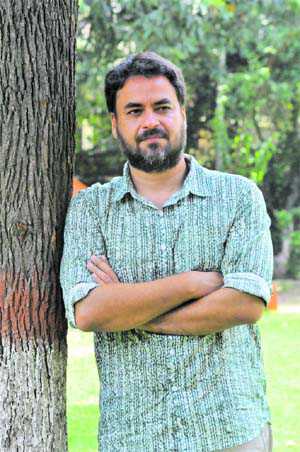Nonika Singh
As a 10-year-old he was a mute witness to the mayhem that unfurled on the streets of New Delhi in the wake of Indira Gandhi’s assassination in1984.
Today internationally acclaimed filmmaker Gurvinder Singh’s Chauthi Koot, delving into the dark chapter of terror in Punjab, is ready for its theatrical release in Punjab and pan India. And though his film is based on noted writer Waryam Singh Sandhu’s short stories and is no way autobiographical, Gurvinder admits “Yes, in a way I have translated the same deep seated fear that I experienced as a young boy.”
Only as he revisits history what you get is a totally earnest perspective that is not only unbiased and humanist but also one that finds resonance in the climate of fear that is enveloping the world. No wonder the usually reticent Gurvinder not the one to give in to hyperbole beams, “Artistes are prophets too.” And poets, philosophers and historians as well. To those who question, “Why rake old wounds why not let history be” well, for one the film is not out to sensationalise. Rather completely shorn off violence as we understand it, the idea is to sensitize people to the issue and to cinema that refuses to walk the conventional path. Whether it’s a gamble, a big risk to flow against the tide, Gurvinder feels that commercial filmmakers have greater stakes. “Our aim was simply to make an artistic film, an endeavour in which we have succeeded.”
In fact, releasing the film too wasn’t mandatory from commercial point of view at least. For, with co-producers such as NFDC and Catherine Dussart of France on board, there is no Damocles’ sword hanging over his head to reap profits. Sure, he wants more and more audiences, especially in Punjab, to watch his film. Most certainly, he would not like to go back to days when he had to show his first film Anhe Ghode Da Daan at the English auditorium in Panjab University. A theatrical release is certainly a step forward and a premiere at the prestigious Cannes Film Festival an honour as big as any.
A film about the plight of common man featuring ordinary men and women yet finding its way into the high on razzmatazz Cannes, you and me might sense a dichotomy here? But he reasons, “Cannes is not just about one thing. It has a Woody Allen film setting the ball rolling and it has world’s biggest auteur makers there as well.”
No, he doesn’t think they have failed to capitalize upon the buzz the film generated when it was screened in the Un Certain Regard section last year. The gap between the film premiering at the Cannes Film Festival in 2015 and its release on August 5, 2016 has not hurt the film’s BO success. So, he believes and his co-producer Kartikeya Narayan Singh. Actually in last one year, the film has done the complete festival circuit and picked up a host of awards at MAMI, Singapore Film Festival et al. While he is only too happy that juries in different corners of the world have bestowed awards upon it, the National Award as the best Punjabi film has him flustered till date, if not completely annoyed. He quips, “What really do they mean by the best Punjabi film what was it competing against?” Don’t get him wrong, he is not deriding commercial Punjabi cinema, “If people are watching it, I am sure there is value to it.” But he does observe rather cryptically, “Art and cinema in particular don’t exist in isolation. Its foundation lies in other arts like literature, music, dance and visual arts. In Punjab sadly, today, there isn’t a single cultural institution that is held in high regard outside Punjab. Besides, Punjabis are viewed as a material rather than thinking society.”
But this Punjabi FTII graduate, who observes more than he talks, thinks more than preens, can’t understand, “Why cinema should not be about silences and not just show characters lost in contemplative thinking moods but also force you to think.”
Seeking that alternative space of entertainment, he wants to usher in new winds of change and hopes Chauthi Koot will mark a new beginning in that direction. Whether the film will herald a new chapter in Punjabi tastes or not, having touched a universal chord around the globe, Gurvinder has already leapfrogged into a universe where language is a tool and cinema a language that cuts across divides.
Unlock Exclusive Insights with The Tribune Premium
Take your experience further with Premium access.
Thought-provoking Opinions, Expert Analysis, In-depth Insights and other Member Only Benefits
Already a Member? Sign In Now










